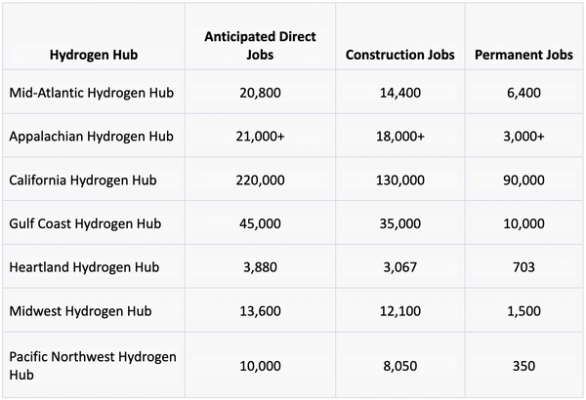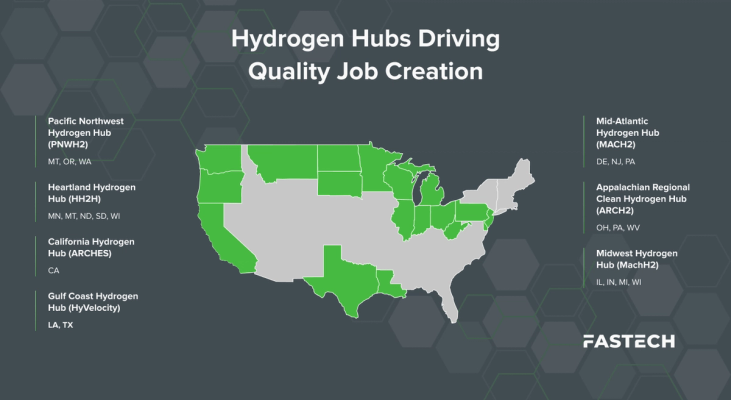Future Fueling: Biden's Hydrogen Hubs and Your H2 Business

In a significant move toward a sustainable energy future, the Biden-Harris administration has revealed plans for seven regional clean hydrogen hubs in the United States, supported by a substantial $7 billion investment.
This strategic initiative is pivotal to achieving a robust clean energy economy. It aligns with President Biden's vision of strengthening energy security, boosting domestic manufacturing, and creating widespread economic opportunities.
Let's delve into the specifics of this ambitious plan and how it aims to drive clean manufacturing and jobs nationwide.
The Regional Clean Hydrogen Hubs Program: A Closer Look
The Bipartisan Infrastructure Law signed by President Biden allocates $65 billion for clean energy investments within the Department of Energy (DOE). By investing in both the Bipartisan Infrastructure Law and the Inflation Reduction Act, the DOE is actively pursuing a range of technologies.
This substantial funding includes $8 billion specifically designated for the Regional Clean Hydrogen Hubs (H2Hubs) Program. The program aims to make setting up and advancing hubs focused on clean hydrogen production and delivery easier.
Selected Hubs and Job Forecast

Data Source: Office of Clean Energy Demonstrations
These hubs are set to use over $40 billion in private investments and create tens of thousands of well-paying jobs. Each hub was strategically placed to address regional energy needs and stimulate technological advancements.

What This Means for Businesses Embracing Hydrogen Energy
Whether you're a business venturing into the hydrogen energy sector or already part of it, here's a breakdown of the substantial benefits you can expect from this initiative.
Market Opportunities
The H2Hubs program ushers in unparalleled market opportunities for companies embracing hydrogen energy.
As the demand for clean energy rises, savvy businesses can position themselves in a growing market. The hubs are expected to create demand for hydrogen-related products and services, offering diverse revenue opportunities for companies to seize.
Technological Advancements
Businesses staying updated with technological advancements can enhance efficiencies. The hydrogen hub infrastructure bill will likely drive rapid developments in hydrogen production, storage, and utilization technologies.
Companies at the forefront of these innovations can gain a competitive edge in a sector poised for significant growth.
Job Creation
As the hydrogen industry expands, so does the demand for skilled professionals. The hydrogen hubs are expected to generate a substantial number of jobs across various skill levels, from construction to highly specialized roles in technology and engineering.
Businesses investing in workforce development can actively contribute to job creation and nurture a skilled workforce to meet the industry’s evolving needs.
Regulatory and Compliance Challenges
The evolving regulatory landscape presents challenges and opportunities for businesses in the hydrogen energy sector. Regulatory changes may introduce compliance challenges but also signify a commitment to shaping a sustainable future.
Businesses need to stay informed and adapt to emerging standards, positioning themselves as responsible contributors to clean energy. Handling compliance challenges sets companies as forward-thinking contributors to the clean energy transition.
Strategies for Businesses In Hydrogen Infrastructure
Navigating the dynamic hydrogen infrastructure landscape requires effective strategies for success. The hydrogen hubs initiative presents a unique opportunity for companies to position themselves as key players in the emerging hydrogen sector.
Market Entry
A well-defined market entry strategy is fundamental for businesses entering the hydrogen infrastructure sector. New entrants should assess the competitive landscape, identify niche opportunities, and craft a plan to establish their presence.
Exploring partnerships with established players or hydrogen infrastructure experts can provide valuable insights, easing entry.
Collaborative ventures can accelerate the learning curve for new entrants, foster innovation, and create synergies that drive the growth of hydrogen infrastructure projects.
Environmental Responsibility
Businesses in the hydrogen sector face increased scrutiny of environmental practices.
Adopting sustainable and environmentally responsible operations is a regulatory requirement and a key differentiator.
Businesses should integrate eco-friendly practices into their infrastructure projects. Such initiatives would include focusing on minimizing carbon footprints and adhering to stringent environmental standards.
Unlocking Hydrogen Success with FASTECH
In the rapidly evolving hydrogen infrastructure world, success requires precision and expertise. FASTECH, your trusted partner in cutting-edge technology solutions, stands ready to propel your business into the forefront of the hydrogen revolution.
FASTECH unlocks unparalleled opportunities for market entry, strategic collaborations, and sustainable operations. Choosing FASTECH means selecting a dynamic ally dedicated to expediting your success in this transformative industry.
Seize the future with FASTECH: The leading provider of end-to-end energy solutions.




